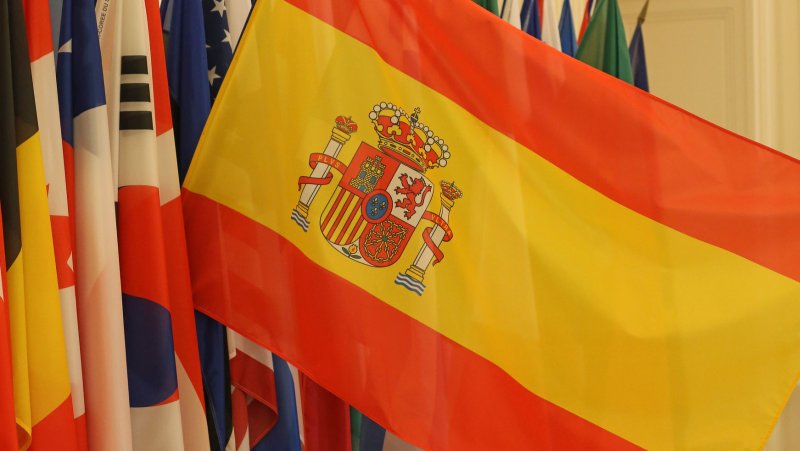The flag of Spain is seen among the flags of various nations on June 8, 2012. UPI/David Silpa |
License Photo
If all eyes are on Spain's stumbling economy, this week all those eyes are seeing red, as the country's bond yields rose precariously.
Yields for benchmark bonds rose briefly to 7.5 percent Monday, well above the 7 percent beyond-hope margin that economists consider unsustainable.
Whether it technically is or not hardly matters anymore. The panic button has a big 7 percent written on the top of it. That's when newspapers howl, investors flee and politicians cower.
Across Europe, parliaments are rushing to approve the $122 billion loan set up for Spanish banks and to green-light the release of about a third of that loan -- about $36 billion -- as soon as possible. Critically, Germany is on board. But all the smaller economies in the currency zone must also approve and Finland, bless its heart, agreed to participate, but only if Spain puts up collateral for its share.
Even collateral in Spain is hard to come by these days. Millions of home construction projects have been abandoned or lie finished, but empty, as if the financial crisis had instantaneous halting power of Mr. Freeze.
Like Greece, the issue of finances has taken on an odd, almost surreal quality to it, given the shape of the Spanish economy. The government has just completed its third consecutive quarter in recession and last week Treasury Minister Cristobal Montoro said Spain's economy was expected to 0.5 percent next year, lowering a previous prediction by 0.7 percentage points.
Spain is serving as the test case for European leaders who agreed to allow the permanent rescue funds they are in the process of setting up to go directly to banks instead of to the government, which would increase that government's debt. The fine line on that provision, however, is that it would not apply to the $122 billion, which the international community has earmarked specifically for Spanish banks.
In response to a slowing economy, Spain's parliament agreed to cut spending by $78 billion on Friday in a measure that raises the value added tax in the country -- a sales tax -- to 21 percent in September.
As the euro slunk to a two-year low against the dollar -- just under $1.20 -- Spain's foreign minister Jose Manuel Garcia-Margallo berated the European Central Bank for not stepping in to buy Spanish bonds and keep its rates at a reasonable level. The ECB is "a clandestine bank that is not doing anything for the debt," The New York Times quoted the foreign minister as saying.
Needless to say, equity markets are shaking off the remnants of optimism that came with the European summit in late June.
Equity markets around the globe continue to assess how much a frightening crisis in Europe will affect their own recovery progress. Then again, the persistent question for investors is "when is a recovery not a recovery?" The United States is no longer in a recession, which technically means it is enjoying a recovery. But if that statement is credible, it is only because it is sliced pretty thin.
In international markets Monday, the Nikkei 225 index in Japan fell 1.86 percent, while the Shanghai composite index in China dropped 1.26 percent. The Hang Seng index in Hong Kong gave up 2.99 percent, while the Sensex in India lost 1.64 percent.
The S&P/ASX 200 in Australia lost 1.67 percent.
In midday trading in Europe, the FTSE 100 index in Britain shed 2.41 percent, while the DAX 30 in Germany tumbled 3.8 percent. The CAC 40 in France dropped 3.2 percent, while the Stoxx Europe 600 fell 2.84 percent.















